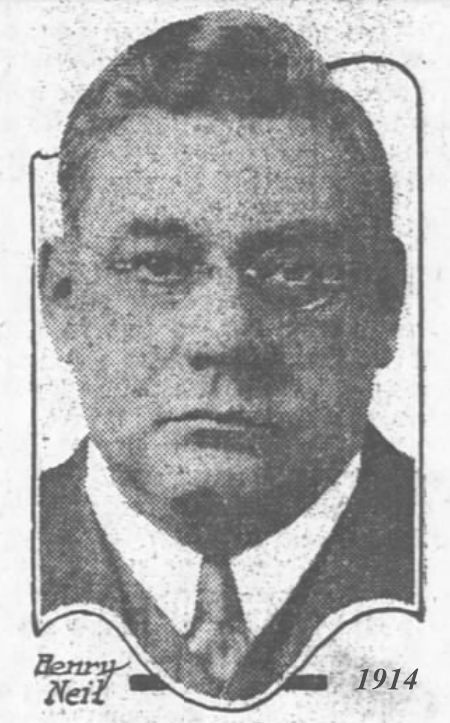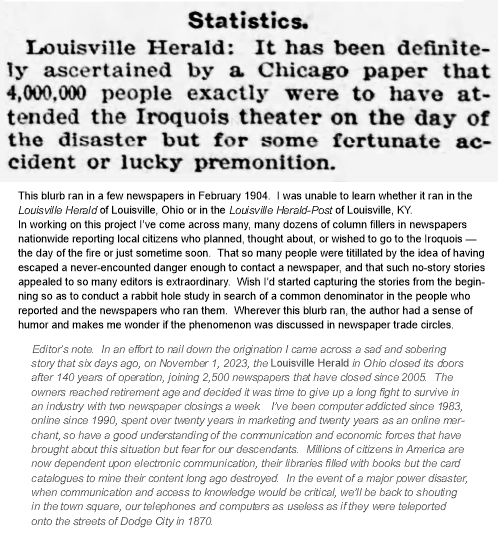|
Three books have been published about the Iroquois Theater disaster, two at its 100th anniversary in 2003 and one in 1904 that was published with two different titles that sold for $1.50
(a crazy $50 today). That two-titled book was authored by Marshall Everett, the pseudonym of Henry Neil (1863–1939). Neil was a
journalist, author, editor, lecturer, educator, and
social activist.
Over the years of this project I've sworn at the inaccuracies in the Everett Iroquois book but have come to respect his effort. Yes, he was an opportunist who fed on the public's
appetite for stories of danger and pathos but so have journalists since forever. So did authors at the 100th anniversary of the fire, and broadcast producers as recently as 2022.
So do participants in unrelated areas, including sports, military and law enforcement. Though I don't realize financial gain, so do I. We humans do like our ugly but I'm not
inclined to chalk it all up to titillation. Imagining ourselves in situations and comparing our likely response with that of the people in the real life event is a type of self
definition. Would I behave with similar selflessness or less, smarter or dumber, braver or more cowardly, more honestly or less?
So great was the public's interest in the Iroquois Theater fire that he could have slapped together and profited on a far less worthy book. Instead he assembled an impressive
reservoir of mostly accurate information about a large number of Iroquois victims in an amazingly short period of time. His speed was certainly so as to hit the market with
his book when interest was at its peak but to history's benefit it also meant that he interviewed survivors, first responders and officials when their recollections were freshest.
Books attributed to Marshall Everett or Henry Neil from 1901 to 1927:
-
Story of the Wreck of the Titanic
-
The Great Chicago Theater Disaster (which is
identical to Lest We Forget Chicago's Awful
Theatre Disaster By The Survivors and Rescuers)
Paperback reprints available on Amazon.
-
Complete Story of the San Francisco Earthquake
-
Tragic Story of America's Greatest Disaster:
Tornado, Flood and Fire in Ohio, Indiana,
Nebraska and Mississippi Valley
-
Lest we forget: Chicago's awful theater horror
(identical to Great Chicago Theater Disaster
-
The complete story of the Martinique horror and
other great disasters
-
Books about wars — Japanese-Russian, Spain &
Filipinos, European battles, and presidents —
Roosevelt the hunter, McKinley's
assassination, and Emma Goldman the Woman
Leader of Anarchists
-
Complete Story of the Collinwood School Disaster
and How Such Horrors Can be Prevented
-
The True story of the Cook and Peary discovery
of the North Pole
-
The book of the Fair: St. Louis exposition
-
The Return of the Mayflower
|

|

Father of seven to nine children, Neil was known as the Father of
Mother's Pensions because of his role in the passage
of legislation in Illinois in 1911 that provided
assistance to the mothers of fatherless children.
Similar legislation was then passed by a majority of
states.
Neil also wrote under the name Judge Henry Neil. In
1918 he was associated in some capacity with movie
director D.W. Griffith. He was also friends with
playwright George Bernard Shaw and Neil's daughter,
Mary Neil, was active in American Woman's Chamber of
Commerce.
An odd aspect of
public interest in the Iroquois Theater fire was
that some folks wanted to reflect on the danger
of a near miss that wasn't even close.

|
